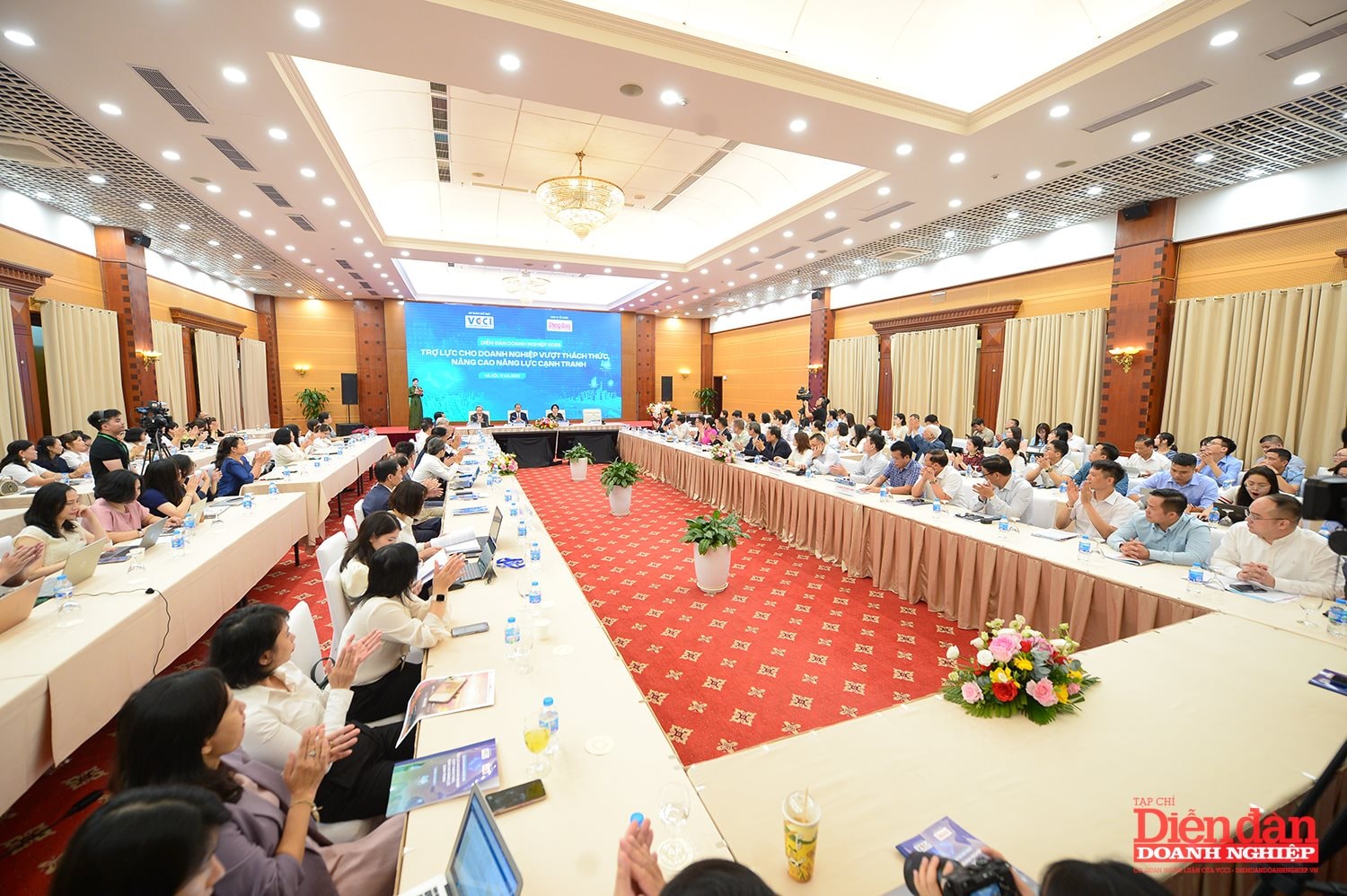BUSINESS FORUM 2025: Empowering Enterprises in a Changing World
The Vice President of VCCI emphasized the need for a “key” solution in institutional reform, improving the business environment, and empowering enterprises to thrive amid global uncertainty.

Speaking at the opening of the Business Forum 2025: Empowering Enterprises to Overcome Challenges and Enhance Competitiveness, held on the afternoon of April 17, 2025, by the Business Forum Magazine, Mr. Hoàng Quang Phòng, Vice President of the Vietnam Chamber of Commerce and Industry (VCCI), noted that this year’s annual forum comes at a time of major global upheaval.
“The global economy is facing numerous risks and challenges—particularly geopolitical tensions, trade and technology wars, rising protectionism, increasing commodity prices, the return of inflation, and disrupted trade flows—all contributing to slower global growth. In addition, concerns over energy security, food security, cybersecurity, and extreme climate events remain ever-present,” Mr. Hoàng Quang Phòng stated.
According to international assessments, the retaliatory tax policy announced by U.S. President Donald Trump on April 2, along with the responses from other countries, is expected to significantly impact global trade, investment, and financial markets—especially affecting countries with large trade surpluses with the U.S., including Vietnam.
Domestic Landscape: Encouraging but Cautious
Domestically, data from the General Statistics Office and Ministry of Finance shows that Vietnam’s GDP growth in Q1 2025 reached 6.93%. In total, over 72,900 new and reactivated businesses were recorded in Q1 2025, up 18.6% year-over-year, averaging more than 24,300 new/reopened businesses per month.
“However, a nationwide survey by VCCI revealed that only 32% of enterprises plan to expand production and business in the next two years,” Mr. Phòng highlighted.

Although nearly 1 million businesses are currently operating, Vietnam’s business community remains largely composed of micro, small, and medium enterprises (MSMEs)—making up 98%—with only about 2% being large corporations.
“This shows that businesses are still facing significant difficulties. Operations are still heavily affected by external factors like geopolitical conflicts and supply chain disruptions, especially in raw materials,” he noted.
Institutional Reform as the Key
To break through in 2025, institutional reform, improving the business environment, and supporting enterprises must be viewed as key strategies. Beyond capital absorption, Vietnam must focus on developing its private sector to enhance competitiveness and gradually master core technologies—integrating deeper into global value chains.
“In recent times, the Party, State, and Government have issued many supportive policies to help businesses recover and promote growth, aiming for a national GDP growth of 8% or higher in 2025. However, in an uncertain world, businesses need even more support from authorities at all levels,” Mr. Phòng stated.
He also mentioned that the U.S. has temporarily delayed retaliatory tariffs for 90 days—including for Vietnam—but this grace period is short, and significant challenges still lie ahead, particularly for key export industries. Therefore, supporting businesses in accessing new markets, promoting exports, and stimulating domestic consumption has become an urgent issue.
Referring to General Secretary Tô Lâm’s article titled “Developing the Private Economy – A Lever for a Prosperous Vietnam”, Mr. Phòng noted that the private sector has played a crucial role in nearly 40 years of economic reform, with many businesses asserting themselves both domestically and internationally.
“However, I believe we all agree that the private sector still faces many barriers limiting its ability to scale and compete. Many household businesses still follow outdated models and lack the drive to transition into full enterprises—some even ‘don’t want to grow,’” he said.
He added that private enterprises face significant obstacles in accessing resources—especially credit, land, natural resources, and high-quality labor—particularly in technology, engineering, and finance sectors. The legal system remains overlapping and cumbersome, with complex administrative procedures that add costs and risks, all of which urgently need improvement.

“Furthermore, government incentives and support policies have not been fully effective. The number of beneficiaries remains small, and fairness in accessing development resources is still lacking,” Mr. Phòng added.
He pointed out that internationally, large corporations play a pivotal role in leading sectoral and national economic growth. Thus, alongside the goal of reaching 2 million businesses by 2030, the 13th Party Congress emphasized the encouragement of large, powerful private economic groups capable of competing regionally and globally. Resolution 41-NQ/TW also sets out the task of building a strong Vietnamese entrepreneurial force aligned with national development goals for a new era.
Currently, there are about 700 business associations and clubs across the country, with around 100 operating at the national level and the rest at the provincial or district level, along with 28 sectoral associations. Most businesses are part of one or more of these groups, forming a growing network that fosters collaboration and mutual support.
To build a more robust business community, Mr. Phòng concluded: “The Business Forum 2025, with the theme ‘Empowering Enterprises to Overcome Challenges and Enhance Competitiveness’, aims to gather valuable insights from all of you. I commend the efforts of the Business Forum Magazine in organizing today’s event.”
He also expressed confidence that through this forum, experts, businesses, and media will join hands to find comprehensive and breakthrough solutions to help Vietnam achieve its goals—advancing the country’s integration and success on the global stage.








